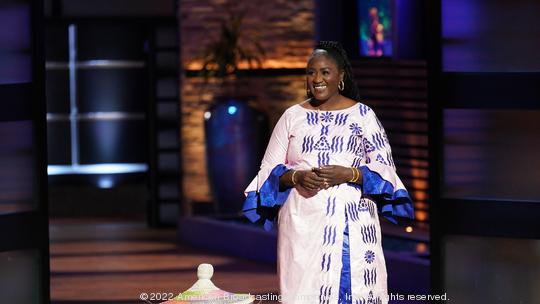
St. Louis entrepreneur Sofi Seck jokes that she probably had too much confidence that she'd walk away from the ABC TV show “Shark Tank” with an investment deal in place.
“Only because I watch the show and I'm a fan of the show and (the investors) really respect numbers and my business has really solid numbers,” Seck said. "I just assumed I would go in there and I would dazzle them and tell them about the numbers and they would just be in.”
But Seck, who pitched her African home decor business Expedition Subsahara on last week’s episode of the reality TV show, had no luck in securing a deal from its high-profile investors.
Seck sought a $500,000 investment for a 10% stake in Maryland Heights-based Expedition Subsahara, which she launched about five years ago. The company sells an array of handwoven items made in Senegal, where Seck was born. Products sold by the startup include baskets, bowls and placemats. Prior to launching Expedition Subsahara, Seck ran her own photography business.
On Friday’s episode, Seck told the show’s investors her company had sales of $900,000 so far this year and lifetime sales of $3.6 million, figures that impressed the “Sharks.” However, investors had concerns about the company’s tight margins, with Seck saying it had net profits of just $75,000 last year.
About 95% of Expedition Subsahara’s sales come through e-commerce, Seck said, adding she had ambitions to expand into distribution through retail partners. That suggestion garnered groans from a couple of the investors. She said the push for retail sales comes as online advertising expenses have climbed. She said an average sale online for her products totals $206, but that it cost $160 to acquire each customer through advertising.
Investor Mark Cuban told Seck he believes her business might operate best with her as sole owner. Another Shark, Robert Herjavec, said he’s willing to make a bet on Seck but didn’t see the opportunity to get a return on his investment.
“I wasn’t expecting to leave there without a deal, but looking back on it, I see a lot of the points they made,” Seck said in an interview with St. Louis Inno.
Sign up here for The Beat, St. Louis Inno’s free newsletter. And be sure to follow us on LinkedIn, Facebook and Twitter.
Seck said she’s taken to heart Cuban’s comment that Expedition Subsahara is suited best as a sole proprietorship. She’s placed an emphasis on making a social impact with the startup, telling the “Shark Tank” investors she’s committed to providing the startup's 120 weavers in Senegal a living wage as opposed to paying them per each piece they produce. The company also has a goal to establish and run a girls school in Senegal.
“If you’re going to do something that’s going to bring change, you have to do it in a way that’s never been done,” Seck said. “Our margins are very tight because of the amount of money I put back into the community back home. It might not be an investable business for a venture capitalist, but it’s still a great business.”
Following Friday’s episode, Seck said individuals have contacted her to express interest in investing in her company. Seck, who began Expedition Subsahara with $500, said she hasn’t taken any outside capital since launching the business. While not completely opposed to the idea, she said she’d like to see how things go with her business following “Shark Tank” before making a decision about external investment.
Despite the cool response from the TV show’s investors about retail expansion, Seck said she still plans to pursue it. So far, she’s relied on social media advertisements to acquire sales, spending $400,000 last year on digital marketing.
“That lever is getting harder and harder to pull because it’s getting more and more expensive to acquire a customer on social media,” she said.
The conversations with the “Shark Tank” investors helped Seck to ensure she takes a cautious approach to expanding into retail, she said. The handcrafted nature of her products means she will have to form a partnership that doesn’t saddle the company with having to produce an unreasonable amount of inventory to meet the retailer’s needs, she said.
“We can’t just pop out a million units. That’s not how it works for us,” Seck said.
While a huge fan of “Shark Tank,” Seck had reservations about appearing on the show and putting herself and her business in front of a national audience. Though, less than a week after appearing on the show, she says she is glad she pitched the investors. Sales of Expedition Subsahara’s products have reached record amounts, she said, starting as soon as her pitch began airing on Friday’s episode. She declined to disclose sales totals since Friday.
While disappointed she didn’t return to St. Louis with a deal in hand, Seck said she came home with more confidence in her business. While it wasn’t the right investment opportunity for the show’s cast members, Seck said the encouragement they offered her will help shape the business’ growth strategy.
“On a human to human level, just standing there talking to them and hearing their advice and how enthusiastic they were about the products, about the business and cheering me on, I left there really, really proud. It was a really positive experience," said said.











